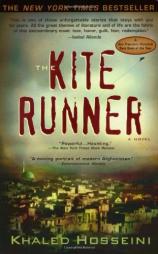The Kite Runner
Review
The Kite Runner
THE KITE RUNNER, Khaled Hosseini’s debut novel, focuses on the relationship between two Afghan boys --- Amir, the novel’s narrator and the son of a prosperous Kabul businessman, and Hassan, the son of Ali, a servant in the household of Amir’s father. Amir is a Pashtun and Sunni Muslim, while Hassan is a Hazara and a Shi’a. Despite their ethnic and religious differences, Amir and Hassan grow to be friends, although Amir is troubled by Hassan’s subservience, and his relationship with his companion, one year his junior, is ambivalent and complex.
The other source of tension in Amir’s life is his relationship with Baba, his hard-driving and demanding father. Desperate to win his father’s affection and respect, Amir turns to the sport of kite flying, and at the age of 12, with the assistance of Hassan, he wins the annual tournament in Kabul. But Amir’s victory soon is tarnished when he witnesses a vicious assault against his friend, who has raced through the streets of Kabul to retrieve the last kite Amir had sliced from the sky, and fails to come to his aid. Amir’s cowardice is compounded by a later act of betrayal that causes Ali and Hassan to leave their home, and he now faces the nightmare prospect of bearing the burden of his ill-fated choices for the rest of his life.
"Khaled Hosseini’s novel offers a potent combination of a setting in an exotic land that has taken on increasing importance to Americans in the last several years with a compelling human drama."
In 1981, following the Russian invasion of Afghanistan, Amir and Baba flee the country for California, where Amir attends college, marries and becomes a successful novelist. Amir’s world is shaken in 2001 when he receives a call from his father’s best friend, informing him that “There is a way to be good again.” That call launches him on a harrowing journey to rescue Hassan’s son Sohrab, orphaned by the brutal Taliban, and at the same time redeem himself from the torment of his youthful mistakes.
Hosseini, a native of Afghanistan who left the country at the age of 11 and settled in the United States in 1980, does a marvelous job of introducing readers to the people and culture of his homeland. He makes no attempt to romanticize the often harsh reality of life there throughout the last 30 years, though he’s adept at capturing mundane and yet expressive details --- the beauty of a winter morning in Kabul, the sights and smells of the marketplace and the thrill of the kite flying tournament --- that demonstrate his deep affection for his native land.
In the end, what gives THE KITE RUNNER the power that has endeared the novel to millions of readers is the way that it wrestles with themes that have resonated in classical literature since the time of Greek drama --- friendship, betrayal, the relationship between fathers and sons, the quest for redemption and the power of forgiveness. For a first-time novelist, Hosseini demonstrates striking skill at melding a page-turning story with intensely involving characters and conflicts. Those features of this absorbing novel give it a timelessness that transcends the specifics of the tale.
The fact that THE KITE RUNNER has spent more than 120 weeks on the New York Times paperback bestseller list and has sold more than four million copies in the United States is hardly an accident. Khaled Hosseini’s novel offers a potent combination of a setting in an exotic land that has taken on increasing importance to Americans in the last several years with a compelling human drama. If he can continue, as he has again in A THOUSAND SPLENDID SUNS, to join those elements in his future work, his readers are likely to remain loyal for many works to come.
Reviewed by Harvey Freedenberg on April 26, 2004
The Kite Runner
- Publication Date: April 27, 2004
- Genres: Fiction
- Paperback: 400 pages
- Publisher: Riverhead Trade
- ISBN-10: 1594480001
- ISBN-13: 9781594480003










